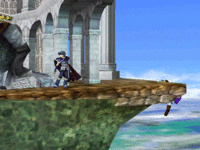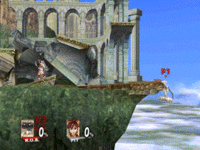Hyrule Jump: Difference between revisions
MaskedMarth (talk | contribs) mNo edit summary |
No edit summary |
||
| (273 intermediate revisions by more than 100 users not shown) | |||
| Line 1: | Line 1: | ||
The '''Hyrule Jump''' refers to the | {{ArticleIcons|ssbm=y|ssbb=y|ssb4-u=y|ssbu=y}} | ||
[[File:SSBM Link Hyrule Jump.gif|thumb|{{SSBM|Link}} performing a Hyrule Jump in ''Melee''.]] | |||
[[File:HyruleJump-Brawl.gif|thumb|{{SSBB|R.O.B.}} performing a Hyrule Jump in ''Brawl''.]] | |||
The '''Hyrule Jump''', sometimes referred to as '''Temple Crossing''', refers to the act of performing a specialised [[stage jump]] on the [[Temple]] stage. It is possible in all games (''[[Super Smash Bros. Melee]]'', ''[[Super Smash Bros. Brawl]]'', {{forwiiu}}, ''[[Super Smash Bros. Ultimate]]'') where Temple is present. | |||
The most well-known Hyrule Jump involves crossing the stage from its upper-right [[ledge]] to its bottom-most platform, with all characters in the games able to perform this maneuver with varying degrees of difficulty. Variants to the Hyrule Jump also exist such as the '''Reverse Hyrule Jump''', which involves traveling the same path backwards, and other routes around the stage; these alternate routes, however, are more specialised and can only be performed by smaller pools of characters. | |||
Temple has historically been universally banned in the competitive ruleset in all of its appearances, and the stage is almost never used, even with the [[Gentleman's Clause]]. As such, the Hyrule Jump is almost never seen in competitive gameplay. | |||
==External links== | |||
* [http://www.youtube.com/watch?v=BnJrht4HP2I All 26 characters perform the Hyrule Jump in ''Super Smash Bros. Melee''] | |||
* [https://www.youtube.com/watch?v=fCR0iSZRX30 Who can make Melee's Reverse Temple Jump?] | |||
* [http://www.youtube.com/watch?v=zeST9-ZklpQ All ''Brawl'' characters perform the Hyrule Jump] | |||
* [http://www.youtube.com/watch?v=Qy-86WAnFwc Falco performing the full circle jump using shell hopping] | |||
* [https://www.youtube.com/watch?v=nSnwe8-2Fds Which characters can do the Reverse Hyrule Jump in Wii U] | |||
* [https://www.youtube.com/watch?v=96kPDMrl0sk Who Can Really Make The Reverse Hyrule Temple Jump - Ultimate DLC up to Pyra/Mythra] | |||
[[Category:Unofficial lingo]] | |||
[[Category:Techniques (SSBM)]] | |||
[[Category:Techniques (SSBB)]] | |||
[[Category:Techniques (SSB4-Wii U)]] | |||
[[Category:Techniques (SSBU)]] | |||
Latest revision as of 07:48, June 22, 2024


The Hyrule Jump, sometimes referred to as Temple Crossing, refers to the act of performing a specialised stage jump on the Temple stage. It is possible in all games (Super Smash Bros. Melee, Super Smash Bros. Brawl, Super Smash Bros. for Wii U, Super Smash Bros. Ultimate) where Temple is present.
The most well-known Hyrule Jump involves crossing the stage from its upper-right ledge to its bottom-most platform, with all characters in the games able to perform this maneuver with varying degrees of difficulty. Variants to the Hyrule Jump also exist such as the Reverse Hyrule Jump, which involves traveling the same path backwards, and other routes around the stage; these alternate routes, however, are more specialised and can only be performed by smaller pools of characters.
Temple has historically been universally banned in the competitive ruleset in all of its appearances, and the stage is almost never used, even with the Gentleman's Clause. As such, the Hyrule Jump is almost never seen in competitive gameplay.
External links[edit]
- All 26 characters perform the Hyrule Jump in Super Smash Bros. Melee
- Who can make Melee's Reverse Temple Jump?
- All Brawl characters perform the Hyrule Jump
- Falco performing the full circle jump using shell hopping
- Which characters can do the Reverse Hyrule Jump in Wii U
- Who Can Really Make The Reverse Hyrule Temple Jump - Ultimate DLC up to Pyra/Mythra